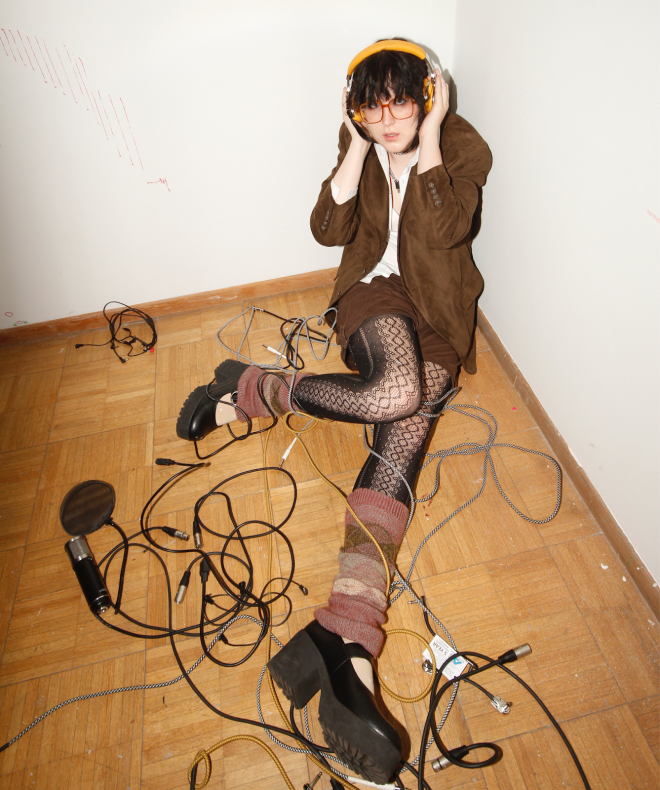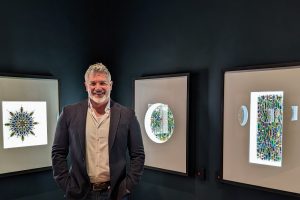Q&A: Laughing and crying with TAMAGOTCHI MASSACRE

photo by Payton “Pdot” Johnson
The loosely-defined internet genre of hyperpop is a maximalist clash of extremes. Distorted, compressed-to-infinity 808s collide against candied, sugar-rush-inducing synth melodies. Instead of cooing sweet nothings, cutesy, chipmunk vocals spew bratty, entitled insults. (Have any of us fully recovered from Laura Les calling listeners “piss baby” with “lil’ cigarette” arms?)
Pioneered by trans and nonbinary artists, hyperpop satirizes and reinvents gender performance, often pushing the conventions of pop music to a decadent, ultrafeminine extreme. For 19-year-old Cleo McKenzie, who makes music under the moniker, TAMAGOTCHI MASSACRE, hyperpop is a sphere where she mediates between psychic extremes, alchemizing gender dysphoria into gender euphoria.
Formerly the drummer of Fayetteville’s Guitar Jar, the Prairie Grove native came of age surrounded by punk and hardcore, frequenting bygone DIY venues like Lalaland and Backspace. As with everyone else on this planet, McKenzie’s world was turned upside down one fateful day in March 2020. But quarantine brought about more upheavals than just social isolation for McKenzie. Already weathering a post-high school gap year and the suspension of live music, McKenzie could no longer keep a long-impending gender identity crisis at bay.
McKenzie’s debut album, FEMINITY.EXE, was born out of weeks of arduous epiphanies and laborious production sessions on her old MacBook Pro. An addictive amalgamation of power pop riffs and manic Autotune singing, FEMINITY.EXE boasts features from TikTok sensation Glitch Gum and hyperpop rising star Phixel. The album approaches femininity with the fantastical wonder of Sailor Moon and spikes sobering reflections on transness and queerness with the cringe humor of Ben Shapiro and Harambe memes.
Currently based out of Los Angeles where she studies music production at Occidental College, McKenzie returned to NWA for an electrifying New Year’s Eve set at the Swamp House, currently Fayetteville’s leading DIY venue, debuting TAMAGOTCHI MASSACRE in Arkansas and donating all concert proceeds to Intransitive, a trans-led social equality nonprofit based out of Little Rock. An initiate of rave culture, McKenzie channeled her digital noise rock soundscapes through every cell of her body, inspiring shifts in the audience’s temperament through her ecstatic pogoing one second and reverent stillness the next. Throughout, she peeled off layers of clothing, tossing pieces of her smart, coffee-colored dress suit into the hands of an adoring audience. On the heels of performing “MFW MIRRORZ : 3 : P x D,” a song about a bout of gender dysphoria so distressing she taped up her mirrors, she concluded her set standing in her underwear, proudly basking in the audience’s gazes. Hands-down the most revelatory and cutting-edge show yet to grace the Swamp House living room, McKenzie’s performance opened up a space in which the restrictive societal confines of gender could be dissolved to reveal the euphoria of self-expression and self-love.
The Idle Class caught up with McKenzie to talk about her musical origins, the writing of FEMINITY.EXE, and her current efforts with side projects GENDERGRIND, sympathy3000, and BOYMODER.
THE IDLE CLASS: How did you get into hyperpop?
CLEO MCKENZIE: I discovered Sophie in 2018, which absolutely changed my life. This was during a time when the hyperpop scene was taking off online, and so I started to get into all the new cool music that was being made. The 100 Gecs album, [1000 Gecs], was really important to me. Quarantine happened, and I decided, “Fuck it, I’m putting everything into this.”
TIC: Hyperpop can elicit such extreme reactions from listeners. Why do you personally gravitate toward hyperpop?
CM: I think there is something inherently trans about hyperpop. I think of artists like Sophie and Laura Les. What they do is put forth a chaotic expression of femininity. Pop music is usually thought about as something girls listen to. Hyperpop takes all of these elements and pushes it to 11. That’s why it really appeals to me.
The chipmunk-sounding pitched-up vocals [in my music] are a response to gender dysphoria. My voice makes me very uncomfortable. I really don’t like singing because of that, but I’ve been getting more comfortable with it. But pitching vocals up or down is a way to say, “Fuck it. I don’t sound like a boy or a girl. I sound like something completely different, you know?” In general, a lot of hyperpop production is just this expression of femininity and transness.
TIC: Where did the name “TAMAGOTCHI MASSACRE” come from?
CM: I knew that I wanted the name to balance morbid aspects with a cutesy aesthetic. But then I had this idea. In the trans community, the term “egg” refers to someone who doesn’t realize that they’re trans yet. And so I was thinking about little Tamagotchi pods look like little eggs, and I had been an egg. It’s about obliterating any aspect of that previous person….And then also it’s girly and cute and fun.
TIC: Can you tell me about writing and recording FEMINITY.EXE?
CM: All through high school, the world knew me as a dude. At the beginning of quarantine, I started to realize, “Hm, something’s funky. I don’t feel that great.” I made my first album, FEMINITY.EXE, at a time when I still didn’t know. Beforehand I had had a couple of thoughts, wondering to myself, “Is something up?” And then it was quarantine and I was totally alone and I could not face myself. I was really sad. Eventually, I realized that what I was feeling wasn’t just in my head; it was who I am. FEMINITY.EXE is me trying to figure out what I was feeling. It’s not the most polished album, but it definitely is just me going insane during the first month of quarantine.
It didn’t even start as a hyperpop album. It was power pop, even pop punk in places. A lot of the songs were written beforehand, and then I figured out how to make them into freaky hyperpop music….I reached out to people online asking if they could lay down some vocals and they agreed. I finished the album in April or May, and then I forgot about it for a couple of months. I released the first single, [“Y2K16”], in August. So not only was I going through crazy life changes and my transition, but I was living at my dad’s house and dealing with college starting soon.
TIC: FEMINITY.EXE is chaotic and disruptive, which makes sense considering the state of mind you were in while creating it. But also you’re so hilarious on this album. I busted out laughing hearing some of these lyrics. Whenever I heard the lyric, “Dicks out for Harambe / Back when we thought we were straight,” I had to rewind to make sure I heard it correctly. The Ben Shapiro interlude where you ridicule his inane transphobic rants with “bruh” sounds was also hilarious. Why do you approach these thorny topics from humorous angles?
CM: Well, I figured people can only take me talking about wanting to castrate myself for so long. [laughs] Humor helps me realize that it’s not that serious. As freaked out as I was at the time, I still tried to have fun with it and to enjoy myself. The alternative would be to realize, “Oh my God, the world is fucking ending, and I hate everything.”
TIC: You went from writing purely power pop ballads to punky hyperpop bangers. Was there a learning curve at all?
CM: You know, the good thing about hyperpop is that no one knows what the f*ck they’re doing, so it’s really just experimentation and figuring things out as you go. I always joke that my creative process is pushing buttons on my computer screen until it sounds good. I definitely have a unique approach compared to other people within the hyperpop community because most people come from a background in EDM. I think I bring a unique style songwriting-wise to the table because of my pop and indie background. A great thing about hyperpop is that it’s truly a genre for the Internet Age. Anybody can do it. [Pholix] is a 15-year-old from Wyoming who’s a leader in this genre.
TIC: What tracks started out originally as power pop ballads?
CM: “Y2K16” for sure. Also “MFW MIRRORS : 3 : P x D” was originally slow and chill. It was a ballad for sure. Recently, my friend Juno Raphael, who is also a trans woman, rewrote the song to be happy, which was really cool that she was able to make that happen out of a song that is so sad.
TIC: Yeah, that song deals so intimately with gender dysphoria. Your music also broaches the concept of gender euphoria. Can you talk to me about how you approach the two?
CM: To be a trans woman is to constantly be bouncing between crazy emotions. Going through puberty again doesn’t help. One minute you feel like the most beautiful thing in the universe. And then you see yourself from a bad angle or your facial hair starts to grow out. And you’re overwhelmed with this feeling that you cannot look at yourself. I used to tape over my mirrors because I just couldn’t do it. Lyrically, I try to capture the rapid flux between the euphoria and the dysphoria and then sonically, with the gritty, distorted sounds and the smoother, candied type sounds.
TIC: Your music makes people want to dance, and though they can be funny at times, a lot of your lyrics address depression and gender dysphoria. What do you make of that contradiction between the content of your lyrics and the mood of your music?
CM: I think it’s reflective of the trans experience. Sure, being trans can be horrendous and awful and make you feel like shit, but in the end, it’s so fun. I’m so happy to be who I am. That [the trans experience] is like my music. It’s sad, it’s kind of jarring, it’s uncomfortable, but it also makes you want to dance.
TIC: You’ve been making waves with the online hyperpop community and DIY scene in Los Angeles; you even opened for Kilo Kish at your university last October. What was it like to return to NWA and play a set as Tamagotchi Massacre for the first time in Arkansas?
CM: It was really awesome to be able to do. I spent so many years in that scene. Obviously, it was a different scene than it is now, but I had been in that space feeling uncomfortable and just not feeling anything. Now I feel so comfortable in my own skin. It was so much better, and it felt so cool. People from my high school showed up, which was weird because I don’t talk to anybody from high school. It was a little weird because of the predominantly white male representation. I’m spoiled. Like, I normally play shows for like 100 queer people, and they’re all dating or something. But overall, it was super cool to come back.
TIC: When you perform, you use your whole body like a dancer. I vividly remember the moment at Swamp where you stiffened your whole body and collapsed onto the floor mid-song. The jaws of everyone in the room collectively dropped. How did you learn to perform like that?
CM: I’ve been going to a bunch of raves in LA. When I’m onstage, I act like I do at raves. I do like to accompany my set with performance art because my music is weird enough. I might as well go all the way. Sometimes I take my clothes off or I might dump paint over my head.
TIC: You’re putting your whole heart and soul out there for people to witness. Does being that vulnerable ever take a toll on you?
CM: Once the songs are written, I feel a lot more comfortable. Writing is an incredibly difficult process for me. There’s a reason I haven’t really written or released anything since the album because it takes a lot out of me. I try to balance the serious parts with the humor, not to make [the music] less vulnerable but to make it feel more me and more comfortable and not overwhelm with all these dark emotions.
TIC: What was your 2021 like?
CM: It feel weird because I didn’t release a lot of music. I feel like I lost a lot of traction within the scene. Before I had a couple thousand of listeners on Spotify, and it felt like people were talking about me. And then I just didn’t make anything.
But also that’s kind of a capitalist mentality, the duty of having to create art for a consumer mass. I try to take it easy on myself. Besides that, I also got into a committed relationship. We’re about to come up on our one-year anniversary. I met my friend Juno, who’s another trans woman and a really great collaborator. I’m now collaborating on a project with her. Our band together is called BOYMODER. It’s going to be power pop with hyperpop influences. I’m very excited for our music. I also started collaborating with my friend Santi for a project we call sympathy3000. We make more computer-y, intelligent dance music.
TIC: Looking back on that period during early quarantine when you were writing and recording FEMINITY.EXE, what do you think that old version of you would think of all that has happened with your music and your life?
CM: I think she would cry. Genuinely, I was in a spot that was so hopeless. And I didn’t know if I was going to survive, you know? I’m living a life I didn’t think I could have, and that’s amazing.
TIC: You created this for yourself. That makes me happy to hear, especially when I think about how violent Arkansas is toward trans people. In your experience, how are things for trans people in California?
CM: There’s definitely less direct violence for sure. I have so much love for any trans person who can survive this state. It’s definitely not perfect in California. There’s lots of really “woke,” liberal people tokenizing me all the time. It’s definitely better. I’ve found a good community over here.
TIC: It’s so important for trans and queer people to find that chosen family.
CM: It’s wonderful to find people who love me as Cleo. Not only are they wonderful, loving people, but they’re super talented and we get to make amazing art together and share stories. I’m moving into an apartment with a bunch of friends next semester, and I’m just so excited.
TIC: What does 2022 have in store for you?
CM: I tend to prioritize projects with other people, but I’m trying to really focus on a TAMAGOTCHI MASSACRE project right now. I’ve written a couple songs that are just insane. I’m very excited for people to hear.
I have been working on a full-length album for BOYMODER with my friend, Juno Raphael. As far as producing for other people, I’m trying to get my grubby little fingers everywhere. I’m helping a lot with Juno’s solo project Messy Room, and doing features on people’s songs. I’m also really trying to polish my live set to just be insane.





Comments